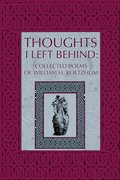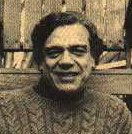
Roetzheim, William H., _Thoughts I Left Behind_. Jamul, CA : Level 4 Press.
179 Pages. Softcover, Perfect Bound. $14.95 US plus shipping. For
ordering information visit www.level4press.com.
Review of _Thoughts I Left Behind
Fertility Doll
Returning home I brought my wife some gifts,
among them was a carved figure—an ugly
woman with huge breasts and bigger belly.
Hawaiians said her name was Hi’iaka.
She stood beside our bed and watched, her eyes
reflecting red in candlelight, her shadow
dancing with obscene and naked joy
to hear Bolero by Ravel, to hear
the primitive music of need and want.
And in one month my wife told me that she
was pregnant after trying for so long.
We loaned her out to Loni, who was pregnant
that same month. And then the breathless call
when Hi’iaka had the same results
for Betty Lou, after four years of trying,
crying, clinics too. but now my laughing
wasn’t easy, now I found that I
was queasy when I thought of Hi’iaka’s
naked dancing, watching with those eyes
that seemed to glow.
I know, I know she’s just
a doll and not a god, not like my god,
the western god that toppled her and all
her kind two hundred years ago, although
she dances on our wall, her shadow leaps
and falls, and quietly she plants her seeds
of pagan thought, of faith in ancient gods.
Those of you who have followed my reviews by now have most likely learned
that I’m a relatively hard critic. Were I to put a book of my own out into
this shark pit, I’d probably be the last person I would want to write on it.
Another thing that may or may not have been evident in reviews that I have
formerly written is that I seem to have developed somewhat of an abhorrence
toward metered or formal poetry. It often doesn’t have so much to do with
the pieces themselves as it does with having so many momentarily inspired
pieces cross my desk by students who have just been reading Wordsworth’s “I
Wandered Lonely as a Cloud.” In three separate classes I have assisted, I
have heard no less that five would-be poets exclaim “I think in rhyme! It
just comes naturally to me.”
So when I open Roetzheim’s _Thoughts I Left Behind_, my initial response is
one of horror. All those old memories of workshop failures come to life,
and a teeny, meter-loving tapeworm starts doubling me over. If I’m to bide
my time reading formal, metric poetry, it had better be damn good.
This book is. Very good in fact.
Roetzheim’s critics have praised the poetry of _Thoughts I Left Behind_ for
its honesty (Gene Auprey), its personal nature (Stephen Scaer), and its
humor (Jackleen Holton), amongst other things. What takes me by surprise
mostly is that in Roetzheim the reader finds perhaps one of the few poets
who has ever picked up a pen and been able to write in form without sounding
trite or forcing rhymes. Where other poets have modified the sonnet form
and called it the “New Sonnet,” and pretty much classified any 14 line poem
as such, Roetzheim is able not only to maintain original Petrarchian form,
but also to do so without making the reader hear somewhere in her head “duh
DAH duh DAH duh DAH duh DAH duh DAH.” It’s subtle, it’s iambic, and in the
few moments where the toughest of critics could go so far as to call it
forced, the emotion and timing is so poignantly accurate, so aptly placed,
that it takes more nitpicking than this reviewer is capable of to point it
out, or let it detract from the poem.
Another thing that greatly impresses me with this book is that Roetzheim
remembers that poetry does not always have to be sullen and serious. There
are two sections of the book titled “Responses to the Dead” that portray the
poet’s reactions to several of those archaic, beastly poems that got us all
writing terrible poetry in high school. Such poems as Rossetti’s “When I am
Dead, My Dearest,” Byron’s “She Walks in Beauty,” and Donne’s “Death be not
Proud” are critiqued and parodied in such accurate and cynical wit that I
found myself quoting them to friends the next day at work. In a response to
Hardy’s “A Broken Appointment,” which is a melancholy piece about the
speaker’s lament that his date never showed up, Roetzheim borrows the meter
and writes:
I mean, I like this piece, its poignant mood,
And poetry to get revenge is cool,
But nowadays we say, “Get past it, dude!”
And real friends tell you when you are a fool, [lines 3 – 6]
I am there with the speaker of this poem. I have my tongue in my cheek
along with him. Moreover, I was thinking the same thing when I read Hardy’s
poem in the first place.
The first notes I took as I began to read this book and prepare for review
read as follows: “Unless you are a lover or meter, specifically iambic, and
are not opposed or put off by rhyming poetry, this book is not the book for
you.” Now having completed reading the book a second time, beginning
through it a third, emailing fragments of the material herein to friends,
jotting down stanzas on the back of notebooks, I can say this: If you buy
one book of poetry this year, make it this one. Tired of being beaten over
the head with Hallmark rhyme? Here’s a book that proves that there is at
least one poet left who can still write in meter without making you feel
like someone’s banging a cast iron pot near your head. But regardless of
your stance on metered poetry, herein lay fine poems of content, emotion,
and universality. The shear grace with which Roetzheim writes proves that
he is a master at this craft. _Thoughts I Left Behind_ is a journey that
you won’t want to miss.
Dave Anderson
Ibbetson Press Update /Somerville, Mass.














































